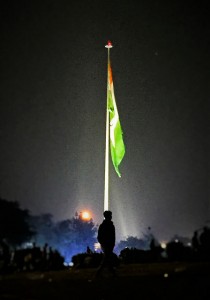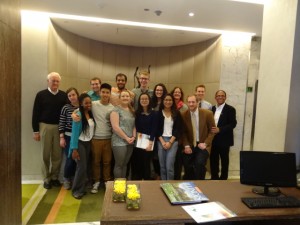Travelogue 10: A fond farewell to India
By Thomas Poole, University of Illinois sophomore majoring in crop sciences
This series of posts was written by students in the ACES 298: Postharvest Loss Prevention study abroad program, which introduces participants to postharvest processes of grains and perishables and loss prevention in the Bihar and Punjab areas of India.

These were the final days in India. We would soon begin our journey back to the USA. And back to the USA meant back to our studies. Yet, this was all still a reality. The excitement was beginning to retreat. When would it return? If it did, would be gradual or come back suddenly?
Thursday consisted of us traveling back from Ludhiana to New Delhi. It was the journey where we practiced patience. Traveling through the countryside reminded me of the imminent journey I would soon make to UIUC. I only focused on what I would be leaving looking outside the bus window. Patches of yellow mustard flowers helped create vibrant scenery. Car horns beeped to individual symphonies. The sky was enveloped in a single transparent cloud.
At left: Tiranga, the national flag of India hoisted at Central Park, Connaught Place. Photo credit: ADMI/Thomas Poole
We eventually arrived in New Delhi to stay a final night at “The Park” hotel. What humored me was their labeling practices. Various complimentary items in our room were labeled with “The” before the name of the product: The Shampoo, The Newspaper, or The Slippers. This was memorable marketing.
Friday brought more eventful experiences. We had the wonderful opportunity to talk to some major players in international development. That morning, we met with Dr. Robert Easter (President Emeritus of the University of Illinois), Dr. H S Gupta (Director of Borlaug Institute of South Asia), Mr. Jonn Slette (Senior U.S. Attaché for Agricultural Affairs), and Dr. Narendra Ahuja (current researcher in computer vision) later on. We were eager to reflect on our experiences during the meeting, which was had professional, yet relaxed atmosphere. We learned more about the upbringing and mission of BISA as its efforts are dedicated toward improving food, security in southern Asia. Dr. Easter shared his intriguing leadership experiences, including his time at University of Illinois. Mr. Slette brought up some valuable points about the economic and political issues in postharvest loss. For example, India’s government requires harvested grain to only be transported by gunny or burlap sacks, a technology considered to be outdated in the U.S. He also mentioned some surprising information, including the fact that India is the world’s largest exporter of beef! We enjoyed a final Indian feast. Overall, it was an inspirational closing to our program.

We spent our final hours shopping close to the hotel. The most memorable item I purchased was an Indian flag from a government store. The cotton fabric gave it a sturdiness to withstand the fiercest of weather. The rope loops gave it a traditional feeling of the country itself. I was purchasing a piece of poetic beauty. It had me thinking about the life the flag leads. It will be susceptible to the neglect, controversies, and hardships of time. It will also brace through to stand with pride, achievement, and humility. For now, I must take it with respect.
At right: UIUC students and faculty members pose with former University of Illinois President Easter (back left) and senior attaché for agricultural affairs John Slette (front right). Photo credit: ADMI/hotel attendant
Thank you to all who have made this program a success. The knowledge gained, relationships made, and scenes witnessed pushes us only forward. These efforts will reduce postharvest losses, and in doing so – the grip of food insecurity.
“You can’t build a peaceful world on empty stomachs and human misery.” – Norman Borlaug
Thomas is a participant in the ACES 298: Postharvest Loss Prevention class organized by the ADM Institute for the Prevention of Postharvest Loss at the University of Illinois at Urbana-Champaign. Throughout the 12-day trip, students interact with policy makers and business partners in the agriculture industry, and work with fellow students at Rajendra Agricultural University (RAU).
Read more blogs in this series:
Travelogue 1: Greetings from India
Travelogue 2: Fascinated by Indian culture, architecture
Travelogue 3: Leaving the city behind
Travelogue 4: Diving into PHL studies with RAU partners
Travelogue 5: To the villages of Bihar, we went
Travelogue 6: Stress in numbers for India rice losses
Travelogue 7: These issues impact all of humanity, we need to learn to work together
Travelogue 8: Like Buddha, seeking enlightenment through partnership
Travelogue 9: Drones, sub-surface irrigation, and other ‘game-changing’ technologies at BISA
Travelogue 11: Bittersweet goodbyes and more surprises



Add Comment